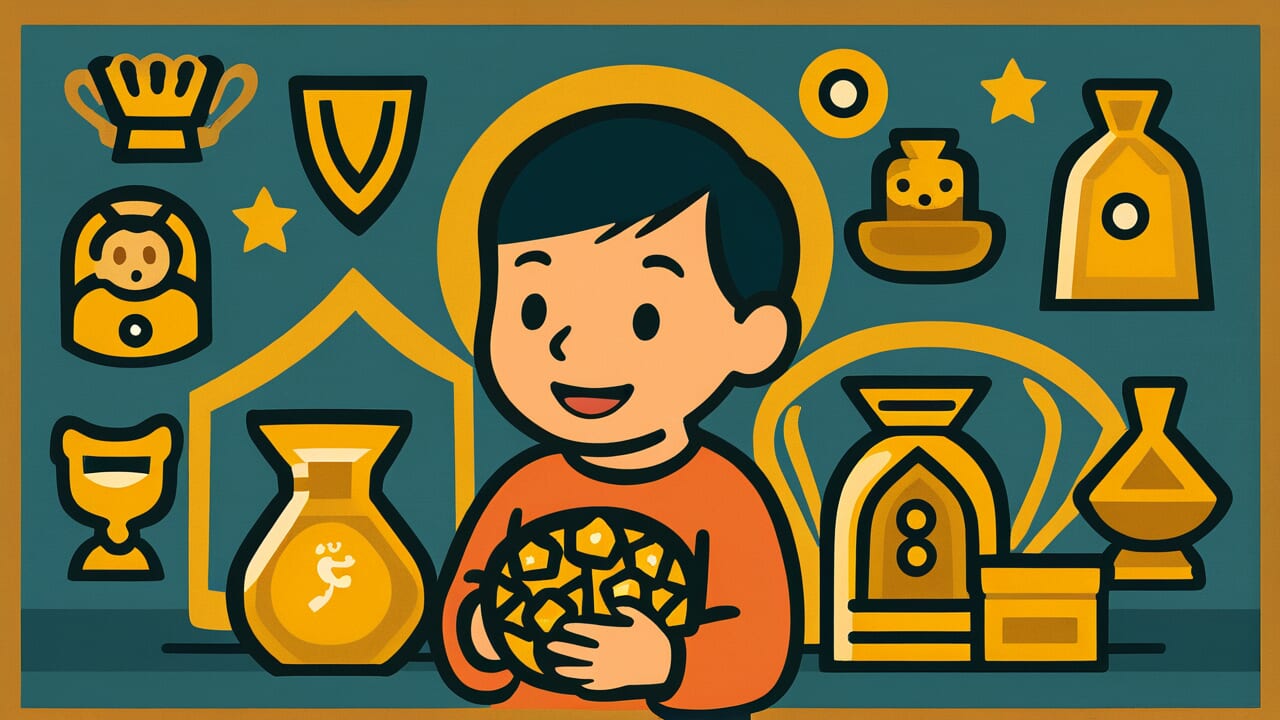How to Read “There is no treasure greater than one’s child”
Ko ni sugitaru takara nashi
Meaning of “There is no treasure greater than one’s child”
This proverb means that children are the most precious treasure for parents. The world has many valuable things like gold, silver, status, and honor.
But for parents, their child’s existence surpasses all of these. It represents the highest treasure of all.
Parents feel this truth when they rejoice in their child’s growth. They feel it when their child’s smile heals them. They feel it when they willingly sacrifice themselves for their child.
This saying is used when talking about the joy of raising children. It’s also used when expressing how precious a child’s existence truly is.
Modern society often emphasizes material wealth and social success. But this proverb asks us what true happiness in life really is.
By expressing a child’s irreplaceable value with the word “treasure,” it conveys the depth and sacredness of the parent-child bond.
Origin and Etymology
The exact source of this proverb is unclear. However, we can make interesting observations from its structure.
The expression “sugitaru” usually appears in warnings about excess. For example, “too much is as bad as too little.” But this proverb uses it completely differently.
In “There is no treasure greater than one’s child,” “sugitaru” means “to exceed” or “to surpass.” The structure is “there is no treasure that exceeds one’s child.”
This expression method uses negation to express the superlative. It’s a traditional Japanese rhetorical technique. It’s the same structure as saying “nothing surpasses this.”
In ancient Japan, the prosperity of descendants was directly linked to family survival. In agricultural society, children were both labor and support for parents’ old age. They also continued ancestral rituals.
However, this proverb expresses something beyond such practical value. It represents the unconditional love parents have for their children.
More than any treasure, more than any status or honor, one’s child is the most precious thing. This saying has been passed down through generations as an expression of the essence of parental love.
Usage Examples
- There is no treasure greater than one’s child, as the saying goes. When I see my grandchild’s face, all my fatigue disappears.
- No matter how successful I am at work, I’ve come to deeply feel that there is no treasure greater than one’s child.
Universal Wisdom
“There is no treasure greater than one’s child” beautifully expresses a fundamental form of human affection. Why do parents cherish their children so deeply?
It’s a manifestation of profound love that goes beyond biological instinct. It’s something only humans possess.
What’s interesting is that this proverb uses the metaphor of “treasure.” Treasure is originally something rare, beautiful, and endlessly sought after.
But for parents, children cannot be compared with others. They cannot be measured by market value. One’s child is a unique existence, and their value is immeasurable.
Throughout human history, there are countless stories of parents risking their lives for their children. Parents protect children during wartime. They skip meals in poverty to feed their children.
Parents give up their own dreams for their children’s future. The foundation of these actions is unconditional love beyond calculation.
This proverb has been passed down through the ages because it expresses a truth that supports the foundation of human society.
Love for the next generation is the driving force that has sustained humanity and developed civilization. The feelings parents have for their children are among the purest and most powerful human emotions.
This love forms the foundation of society itself.
When AI Hears This
The most important thing for living organisms is passing their genes to the next generation. According to “parental investment theory” proposed by evolutionary biologist Robert Trivers, the energy and resources parents pour into children are actually the result of cold calculation.
For example, birds carry food many times their body weight to their chicks. This behavior increases the parent’s own survival risk. But from the gene’s perspective, it’s rational.
If the parent survives but the child dies, the genes end there.
What’s interesting is that this investment has clear numerical basis. A child carries 50 percent of the parent’s genes. Successfully raising one child is genetically equivalent to sending half of yourself into the future.
Furthermore, children have long reproductive periods and the potential to produce grandchildren and great-grandchildren. Mathematically calculated, investing energy in a child’s survival yields greater genetic returns than using it for the parent’s own survival.
The human brain has a mechanism that releases pleasure chemicals like dopamine and oxytocin when seeing children. This is a reward system created by evolution.
In other words, the feeling that “children are treasure” is the very program genes embedded in humans to maximize self-replication. This proverb is remarkable wisdom that intuitively captures biological truth.
Lessons for Today
This proverb teaches modern people about the essence of life priorities. We daily pursue career success, economic stability, and social recognition.
These are certainly important. But this proverb gives us a chance to pause and think. What is truly important?
In modern society, many people struggle to balance career and child-rearing. However, this proverb doesn’t force a choice between “children or work.”
Rather, it teaches the importance of valuing quality time with children, no matter how busy we are. It helps us realize that casual moments spent with children are the most valuable time in life.
Also, this proverb is a message not just for parents but for all adults. Raising the next generation isn’t just parents’ responsibility. It’s society’s responsibility as a whole.
Building a culture that cherishes children as society’s treasure. That’s the investment in the future each of us can make.
Why not turn a warm gaze toward the children around you?



Comments